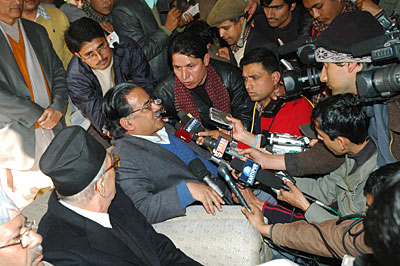 KIRAN PANDAY |
Celebrated commentator CK Lal's column in the last issue ('Junket journalism', #492) must have been an interesting read for students of journalism like myself. Lal's comment that this author "unabashedly promotes causes close to his heart" through the use of media has a wider relevance to the practice of journalism.
I have been arguing lately that the core value of 'public service' in journalism needs a radical redefinition. After studying journalism and working as a full-time journalist for nearly 18 years, I have been left wondering whether what I have been doing all these years has actually served the public.
Philanthropy is the cause that I have been "unabashedly" promoting through the use of media and that is what seems to have irked Lal. Through my various articles in the vernacular press, I have explained why I have been doing so.
First, the type of journalism practised around the world, which primarily revolves around politics, conflict and disasters, may not actually be enough to do justice to the fundamental objective of the profession we are in�- public service. Day in and day out, we hear about the violence in the Middle East and poverty and conflict in Africa and Asia. Has the coverage changed anything? It seems clear the gap between the rich and the poor has widened, environmental degradation is increasing, public insecurity is high, and the list goes on.
The continuous flow of negative news and commentary seems, rather, to have desensitised society to human misery. I have realised however that many people find positive news refreshing and inspirational amidst the all-pervasive gloom surrounding society.�Coincidentally, this weekly has been at the forefront in Nepal in promoting positive news, which has brought about visible change: Bhairab Risal's 'Sun light in Humla'(#245) and Captain Vijay Lama's 'Nyanopan' campaign ('I'm a Nepali first', #328) are a couple of examples. I doubt if the scores of columns on political punditry I've published in local and international media have had as much impact as those two features on life-changing noble acts. They have directly benefited some of the most vulnerable communities, who struggle to feed themselves every day and can't even imagine engaging in moral discourses in the national press as I am doing now.
Second, apart from the positive news, I have also concluded that the media's core value of public service would be served better if it were to be used to promote philanthropic causes. There is a strong complementary relation between the idea of public service in journalism and philanthropy that has remained largely unexplored. The question is, if politicians and many politically biased commentators constantly harp about their political beliefs in the opinion pages of newspapers, television and radio interviews, what is wrong in promoting philanthropy through the use of media? If Lal can support and promote 'lok tantra' (democracy) and a highly controversial GP Koirala, why can't one promote 'lok kalyan' (philanthropy) and the likes of Uttam Sanjel and Dr Upendra Mahato? Eighteen thousand poor Nepali children are getting a relatively good education for just 100 rupees a month because of Uttam Sanjel. And through Dr Mahato's support, at least another 18,000 poor children will also benefit. Who should be "mindful of the principles and personalities" they promote � those who support abstract political views and some of the most loathed politicians in the country, or those who support solidly result-oriented social agendas and real change-makers?
We are so used to politico-centric journalism that one hardly questions it when Lal promotes GP Koirala, Hari Rokka promotes Prachanda or Bishnu Rijal promotes Madhav Nepal. However many people, like Lal, are uncomfortable with the idea of a philanthropic agenda being promoted through the press. It is ironic that the obsolete and recycled views of the same politicians get so much coverage every day in the press while the uncountable excellent initiatives undertaken by so many people throughout the country are underplayed or entirely ignored.
Until and unless we come out of this pit of politico-centric junk journalism and try to see the wider world, we will fail to understand the core value of the profession we are in.
rabindra.helpnepal[at]gmail.com
READ ALSO:
Junket Journalism, by CK Lal - From issue #492 (05�March 2010- 11 March 2010)



